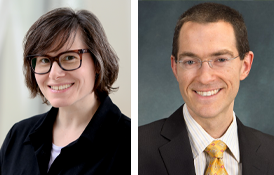IN THIS ISSUE: Academy Awards 2022 | Forced Migration & Climate Change | Posters | 2021 Plenary | Debate | A&E Abstracts
‘We had a goal to turn the wonderful academic content of the annual meeting into published academic content’
A paper documenting and expanding on a plenary and debate from last year’s ACLP Annual Meeting has been published in the Journal of the Academy of Consultation-Liaison Psychiatry (JACLP), thereby preserving the proceedings and influencing a far wider audience.
“For CLP 2021 we had a goal of increasing opportunities to turn the wonderful academic content of the Annual Meeting into published academic content,” says CLP 2021 program chair, Lisa J. Rosenthal, MD, FACLP. “Now we have accomplished our goal—not only were abstracts of posters and papers published in JACLP, now we have also published a paper from a plenary session.”

The 2021 plenary included speakers from different interdisciplinary perspectives including psychiatry, neurology, and medical intensive care, and included Wes Ely, MD, MPH, Arjen Slooter, MD, PhD, and Mark Oldham, MD. The session was moderated by Cathy Crone, MD, FACLP, and introduced by Jose Maldonado, MD, FACLP. The importance of the subject to C-L psychiatrists had been demonstrated by the Academy’s evidence-based lobbying to have the diagnosis-related group coding for delirium upgraded, putting it on an equal footing with metabolic encephalopathy.
The resultant paper, An Interdisciplinary Reappraisal of Delirium and Proposed Subtypes, was published in JACLP.
The paper highlights the disparate terminology used to describe delirium in different specialties, and calls for a common terminology. Delirium impacts more than 7 million older adults in the US each year at an annual cost variously calculated at between USD 40–160 billion, yet each specialty uses different nomenclature.
“Despite the immense public health impact of delirium, its clinical detection remains limited, efficacious treatments are lacking, and no intervention has been shown to prevent its poor associated outcomes,” says the paper.
“It also remains unclear to what extent the relationship between delirium and its poor outcomes might be epiphenomenal and whether preventing or treating the syndrome of delirium improves these outcomes. We believe these failures of clinical practice call for a re-evaluation of the prevalent model of delirium.”
The authors endorse a joint position statement by 10 societies that describes acute encephalopathy as a rapidly evolving (< 4 weeks) pathobiological brain process that presents as subsyndromal delirium, delirium, or coma, and they propose the following refinements:
“The final common pathway of delirium appears to involve higher-level brain network dysfunction, but there are many insults that can disrupt functional connectivity,” say the authors.
“We propose that future delirium classification systems should seek to characterize the unique pathophysiological disturbances (endotypes) that underlie delirium and delirium’s individual neuropsychiatric symptoms.”
The authors offer provisional means of classification so that novel subtypes might lead to specific intervention to improve patient experience and outcomes.
Their paper concludes by considering future directions for the field: “Key areas of opportunity include interdisciplinary initiatives to harmonize efforts across specialties and settings; enhance underrepresented groups in research; integration of delirium and encephalopathy in coding; development of relevant quality and safety measures; and exploration of opportunities for translational science.”
Says Dr. Rosenthal: “This publication represents a wonderful opportunity for those preparing for this year’s annual meeting to turn their content into lasting academic content.”